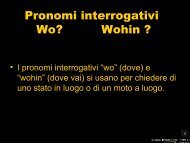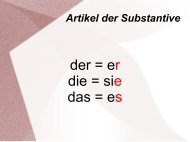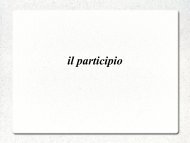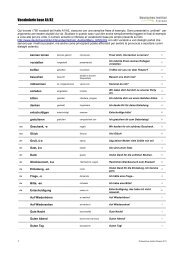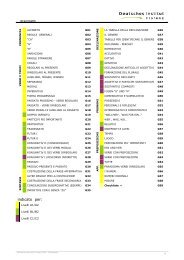Inhaltsverzeichnis - Deutsches Institut Florenz
Inhaltsverzeichnis - Deutsches Institut Florenz
Inhaltsverzeichnis - Deutsches Institut Florenz
You also want an ePaper? Increase the reach of your titles
YUMPU automatically turns print PDFs into web optimized ePapers that Google loves.
Grammatik A<br />
PRONUNCIA<br />
Come si legge?<br />
La buona notizia: Il tedesco si legge tutto sommato come si scrive, a parte poche variazioni rispetto<br />
all'italiano.<br />
Tutte le consonanti in tedesco sono pronunciate in modo un po’ più “duro” rispetto all’italiano. Avete<br />
presente l’accento e le caricature sui tedeschi quando parlano l’italiano? Tipo: Kvesto, Ghermania,<br />
Bontschuorno, ToRRino.<br />
Sono difetti che per te parlando il tedesco diventano un pregio. Allora imita KVesta pronuntschia,<br />
l’importante è non vergognarsi.<br />
�<br />
gli audio con la pronuncia giusta trovate a:<br />
http://www.deutschesinstitut.it/Grammatik_uebungen_hot%20pot/grammatik_pronuncia.html<br />
oppure www.istitutotedesco.it > e-learning > grammatica> pronuncia<br />
C (nelle parole tedesche appare solo nella combinazione ch, ck, le altre sono parole straniere)<br />
K (si scrive sempre con la “K” : Kommunikation, Katalysator)<br />
G , H , J , R , Y , Z ,<br />
V e W e , (per esempio Volkswagen)<br />
Q (si combina sempre con u, si pronuncia , Qualität)<br />
“ch”<br />
Cominciamo con l’unico suono un po’ più<br />
difficile perché non esistente nel sistema<br />
fonetico italiano: la “ch”. Il suono e luogo di<br />
articolazione è comunque molto vicino all’ <br />
in “Juri” o “Juventus” o alla .<br />
Provate anche con “iiiijjjjjjch”togliendo la voce<br />
(il sonoro) alla jjjj, ma lasciando la lingua tesa<br />
nella stessa posizione.<br />
Il suono “ch” si combina anche con altre vocali chiuse<br />
�<br />
mich, dich, ich, sich, sicher, nicht, nichts,<br />
Kirche, endlich, wirklich, Licht, Sicht, kichern,<br />
China, Chemie, Schicht, richtig, wichtig, lustig,<br />
fünfzig<br />
echt, recht, rechts, sechzehn, sechzig, Becher, rechnen, ächten, nächtlich<br />
leicht, weich, schleichen, reich, beichten, seicht, erleichtern, bezeichnen, zeichnen, speichern<br />
euch, Seuche, leuchten, feucht, scheuchen, keuchen, heucheln<br />
möchten, ich möchte, du möchtest, Töchter, Löcher, Küche, süchtig, flüchtig, Sprüche<br />
Dopo le vocali aperte a, o, u, la “ch” si pronuncia dura e con la bocca aperta<br />
machen, lachen, Sachen, Nacht, auch, brauchen, rauchen, Versuch, Geruch, Flucht, doch<br />
”h”�<br />
La “h” aspirata è identica alla di “casa” in toscano puro. Non è una aspirazione molto forte ma deve<br />
essere sentita. Dopo una vocale non viene pronunciata ma allunga soltanto la vocale.<br />
Haus, Hans, hier, hassen, haben, hat, Hose,<br />
halt, Hund, gehen, sehen, wehen, Ehre, sehr, Fahrt<br />
© <strong>Deutsches</strong> <strong>Institut</strong> <strong>Florenz</strong> 2011 Grammatik_A 3



